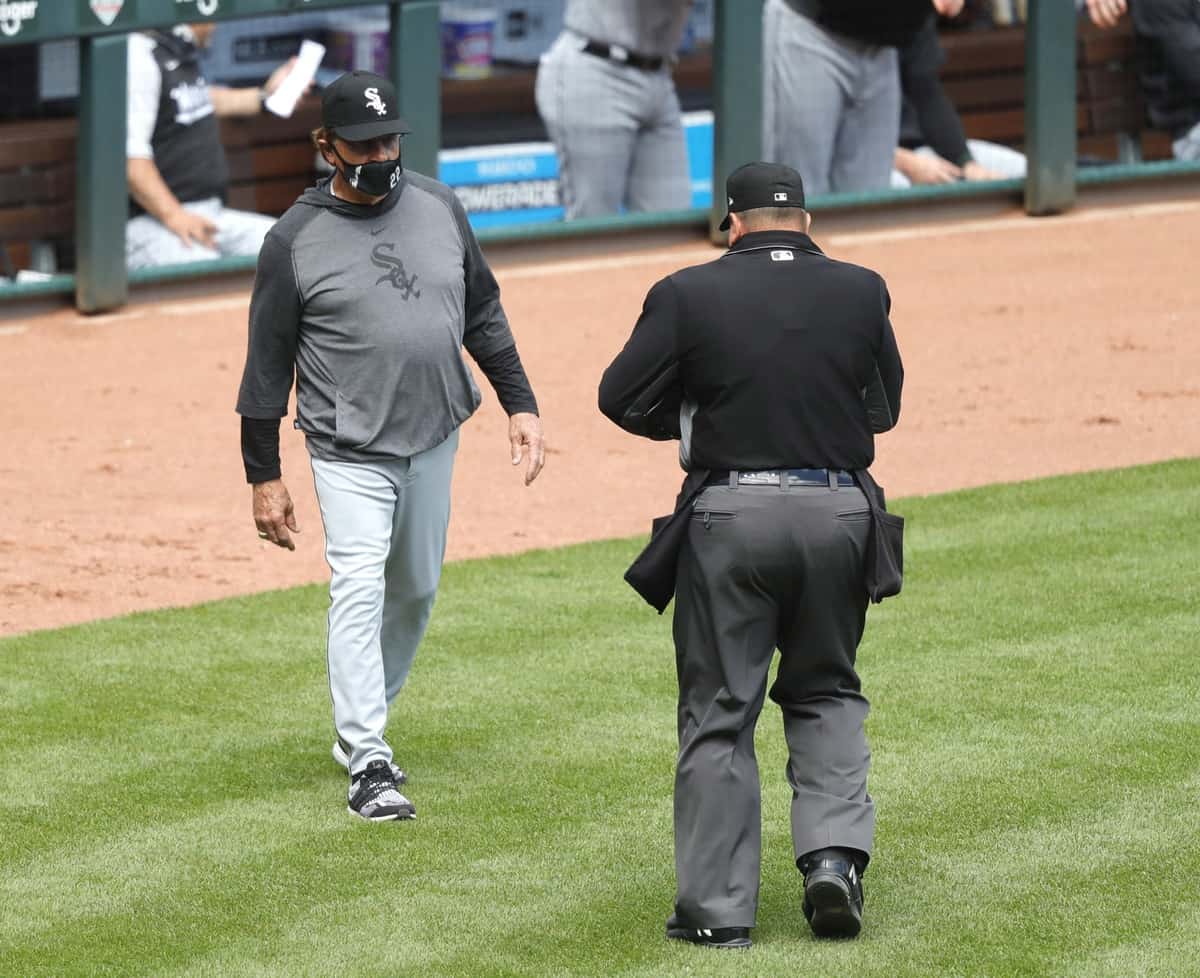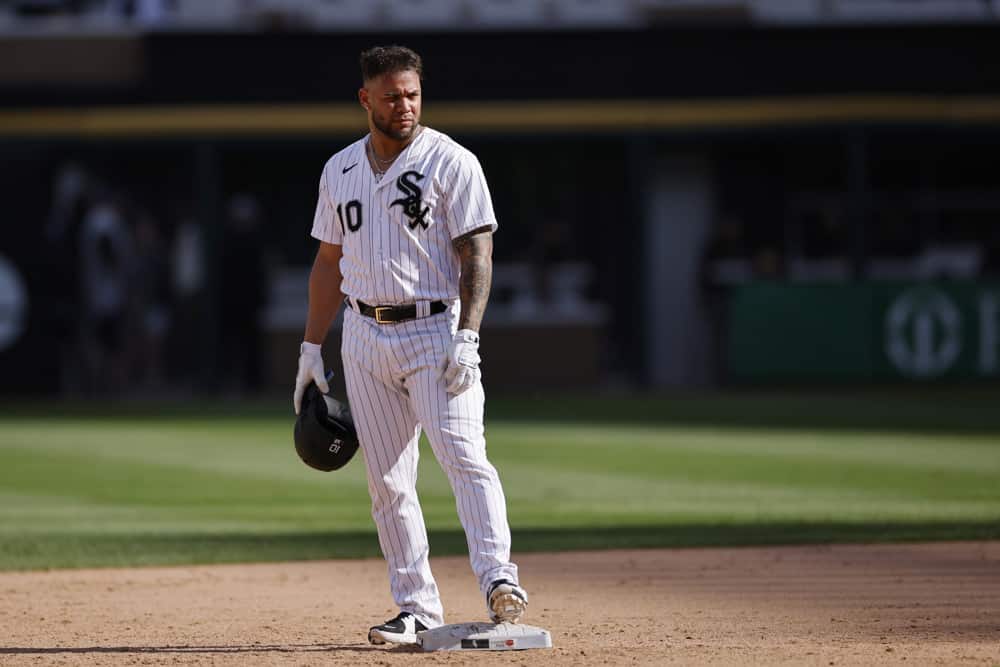Babe Ruth contributed many things to the game of baseball as we know it. Among the lesser accomplishments, he was thrown out at second to end the 1926 World Series, generating to go-to example for an ill-advised stolen-base attempt.
Ruth was good for about 10 steals a year, although he was usually bad for more unsuccessful attempts. That and moderation were the only things he didn't do well, so you had a player willingly defining a Game 7 by his weakness.
But the situation -- Ruth was walked with two outs in the ninth inning with Grover Cleveland Alexander on the mound -- you could at least understand the value of getting to second, even if Ruth wasn't the best guy to try it.
I regret to inform you that Leury García is not Babe Ruth. I regret to inform you further that García didn't even have Ruth's rationale when he was cut down at second for the second out in the 10th inning Wednesday afternoon. His run wasn't meaningless, but it also wasn't the priority. The priority was maximizing the number of chances for Billy Hamilton and the on-deck Jake Lamb to score Liam Hendriks from third, which would give the Sox a lead the Reds would have to answer in the bottom of the inning.
Neverthless, García's attempt to steal second was thwarted for the second out, Hamilton struck out, the Sox didn't score, and Hendriks allowed the losing run for the White Sox's third extra-inning loss in as many chances.
There were three mistakes in the inning, and only one had to do with not knowing a rule in a National League park. La Russa had Hendriks on second because he didn't know that he wasn't required to have the pitcher run for himself as the automatic baserunner in extra innings. James Fegan had to read the rule to him afterward ...
This is what’s on https://t.co/YLJsKuHKXZ’s site about the extra-runner rule. La Russa said they weren’t aware and thought it had to be the previous batter no matter what. Said they wanted García to steal second, rather than it being his own call pic.twitter.com/B2U9qXZkjq
— James Fegan (@JRFegan) May 5, 2021
.... after which La Russa said, "I’ll re-read that situation. I’m guessing you know the rules better. Now I know.”
We'll get back to that in a second, but let's first tie up the loose ends of the standard on-field strategy. Because La Russa had his closer on third however it happened, Cincinnati didn't have to respect his presence on third during an attempted steal of second, even if they weren't in a standard defensive alignment. Tucker Barnhart could throw through, and he's very good at throwing through, especially on an errant high fastball that was practically a pitchout.
Beyond the idea that a closer was on third, running García didn't make sense because of who was at the plate. Hamilton has grounded into 18 double plays for his career. For comparison, José Abreu has topped that total in three separate seasons. Hamilton's not a great bet to get a run home, but he's a worse bet to make two outs during one of his at-bats, which is the thing that absolutely must be avoided. Except the Sox enhanced that possibility without Hamilton's with García getting cut down at second, which then shifted the weight of the team's most pressing weakness, which was Hamilton's ineffectiveness as a hitter. The architecture of the inning buckled like a badly built balsa bridge.
Now, that's all there for the picking, even if La Russa had to have Hendriks on second. But as Fegan so helpfully pointed out, La Russa could've chosen Abreu. Abreu isn't a typical baserunning threat, but he can take the extra base when it's presented, and thus he can't be ignored.
Maybe it's relatable that La Russa didn't know the rule, but his counterpart in Cincinnati didn't provide him any cover.
David Bell said he knew the rule, "the league made it really clear that it was going to be a new rule in spring training"
— C. Trent Rosecrans (@ctrent) May 5, 2021
I don't think Bell was out to embarrass La Russa, because here's a Dayton Daily News story before the series about Bell's admiration for his former manager. Nevertheless it reminded me of the game in 1993 I dug up for a post about Scott Ruffcorn, in which the Angels unapologetically ran on a 45-year-old Carlton Fisk. California manager Buck Rodgers told reporters afterward, "When you elect to play that extra year or two, that's what happens sometimes. We all saw Willie Mays. A bunch of things happened."
That seems like it's playing out in the dugout, because La Russa now needs a second hand to count mistakes for which he's had to apologize, and we're barely into his second month.
He's not acting alone. We know nothing about his new coaches, and while you can pin that more on COVID-19 protocols limiting media than anything else, here's a case where Miguel Cairo or Shelley Duncan could have made presences felt. Some reliable veterans are struggling, and the fraying of the one-ply roster elsewhere makes a lot of decisions a helpless debate between "bad" and "worse," and White Sox fans deserve better than Hamilton and Jake Lamb.
But Jerry Reinsdorf asked for the baseball world to put dugout decisions under the microscope by hiring La Russa after a nine-year layoff and with a pending DUI charge, rather than interviewing candidates who were qualified, relevant and not in any legal trouble. Now it's a full-blown gaper's block.
It's not great that I was already planning on writing about La Russa because Ken Rosenthal offered his own report into whether La Russa had started losing the clubhouse. Rosenthal's assessment was less acidic than Jeff Passan's, softening the possibility of strife by saying that every manager has to feel out a new team, and every manager has players who don't like him. He also included a defense from Rick Hahn, and independent of Rosentahl's story, Abreu maintained steadfast public support of the old new guy.
It's also not great that there's a fresh new example of managerial ineptitude that could theoretically render Rosenthal's measured assessment outdated after just a couple of days. Here's where I'll also mention that no baseball reporter, Chicago or national, has referenced the turbulence at La Russa's Animal Rescue Foundation. I'm hesitant to harp on something I only know from a handful of stories from a couple of Bay Area papers last reported more than a week ago, but La Russa keeps managing as though he's thinking about something else, and those stories are truly something else.
The White Sox are 16-13 despite these issues, and there are ways to improve that record without even bringing La Russa's decisions into it. The problem is that baseball is tough, and so one can't merely rely on their talented players besting another team's talented players in a zero-sum game, which is why dugout decisions can often overshadow what happened on the field even if they had less to do with a game. Most decisions on the field are spontaneously forced upon players who have only fractions of seconds to react. The decisions in the dugout usually can and should be anticipated, so wrong turns are harder to defend. But what if the the guy in the dugout is a product of a spontaneously forced decision? All this is what it might look like when the call is coming from inside the house.
(Photo by David Kohl / USA TODAY Sports)





